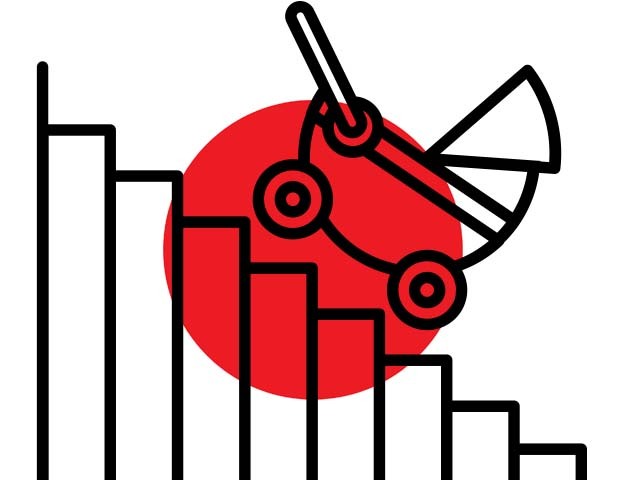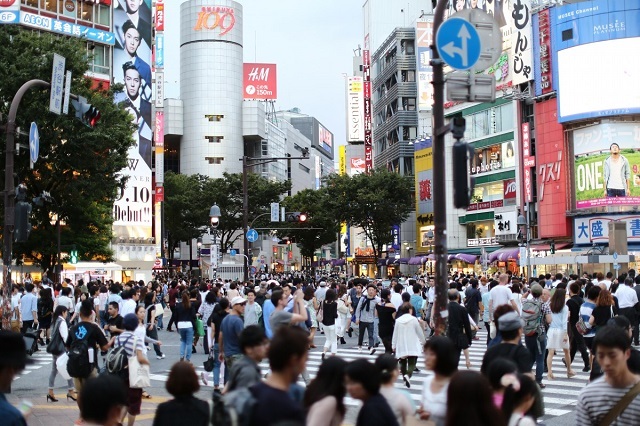Could sex tech solve Japan’s current state of emergency?
In 2019 Japan was ranked the nation with the best reputation in the world, scoring highly on quality of life, values, culture and other factors which make up a ‘happiness’ index. It is the third largest country in the world in terms of GDP and is regarded as one of the top places to live.
Yet, despite being such a successful, beautiful and rich nation, the population of Japan is falling at an alarming rate.
Statistics show a decline which, if it continues at the same rate, will see the population halve by 2100.
This worrying prospect has stimulated some interesting and bizarre concepts introduced by officials including AI dating.
In this look at AI Dating in Japan, we examine what the government is doing to help reverse Japan’s declining population.
Why Has Japan Got a Declining Population?
We reported on the falling population problem in Japan a few years ago when we asked the question ‘Are Young People in Japan Not Having Sex Anymore?’.
Since our report, the population in the country has continued to shrink but the rate at which it is doing so has become ever more alarming.
Since 2010, the percentage decline has been rising from a decrease of 0.036% to 0.41% and, according to most predictions, looks set to continue on this sharp curve.
With some sources estimating that the population in Japan could fall by as much as 30% by 2060 and halve by 2100, the government (naturally) are keen to take action.
But why are the Japanese not having babies? We take a look at some of the contributing factors.

Buoyant Adult Industry
Japan has an international reputation for its diverse and active sex industry with the country having pretty liberal attitudes towards sex and sexuality.
However, it is not really sex which is at the heart of this culture. Instead, it is masturbation which seems to drive Japan’s adult industries. Sex tech companies have pioneered creative new ways to offer people a satisfactory alternative to a real sex life and toys have become so advanced that its little wonder people in Japan aren’t prepared to swap them.
From advanced sex dolls, automatic strokers and blowjob simulators to venues offering all kinds of adult company, the Japanese are spoiled for choice.
The result is that there is a much more recreational approach to sex with the focus on ‘novelty’ as opposed to necessity. If you can get your rocks off in a city which is built like an adult theme park then why bother with a steady partner, right?
Workaholics
Japanese culture has always centered around the workplace and there is still a strong tradition that achieving success in your career is the top priority.
This has often meant that men and women work hard but global changes in the economy has meant that the ‘job for life’ phenomenon (once associated with Japan) is fast disappearing. The result is that employees must now put in more hours to impress their bosses.
Reports published by CNBC show that over a quarter of Japanese businesses require their employees to work more than 80 hours extra on top of their 40-hour working week.
Often unpaid overtime, the pressure on employees to spend time at work leaves little time for dating.

Financial Pressures
Demographers often use birth rates in a country to measure stability. The general rule of thumb is, that if people feel secure then, they will start a family.
A falling population is often an indicator (or result) of an economic downturn.
However, Japan has been enjoying a relative period of stability and with the exception of the global crash in 2008, GDP is healthy.
So, if the country is economically stable, why are people worried?
Just like in the West, the culture of work has been changing over the last decade and the ‘gig economy’ in Japan has meant that there is less job security.
Dating Going Out Of Fashion
As a nation, Japan has long had family at the heart of its traditional life but in the last few decades this has rapidly been changing.
Not only are men and women choosing not to get married but many remain virgins.
A study published by Japan Times in 2016 revealed that 60% of unmarried women and 70% of unmarried men aged between 18 and 34 were not in relationships. Not too surprising, you might say, but consider this.
Around two in five of this group of men and women were virgins suggesting celibacy is becoming a new ‘norm’.

Known as ‘herbivores’, this phenomenon has not gone unnoticed in Japan with the world’s media also interested in why this might be the case.
Researchers for the National Fertility Survey of Japan suggest that around a third of women (37.4%) and men (36.6) aged between 18 and 24 would describe themselves as ‘disinterested’ by relationships.
Relationship Phobias
Japan’s (almost) obsession with alternative forms of sex may be contributing to an aversion to for real-life/human interaction.
Let’s face it, if you grew up with it being normal to fall in love with anime characters and being able to enjoy a satisfactory sex life using pay-by-the-hour VR sex booths then what is the appeal of having a partner?
Busy Japanese men and women may not have the time for a relationship but they may also not have the desire to even form one.
Digital, VR and AI technology has advanced to such a degree that many people no longer even feel lonely without a partner. And with cities like Tokyo offering pink salons, soaplands and sex clubs then there just doesn’t seem to be much point to one either.
Gender Inequality
Another factor which may be contributing to the falling birth rate in Japan is the prevalence of traditional gender roles still at play.
Japanese women can pretty much kiss their careers goodbye as soon as they get pregnant and instead of looking forward to excelling in their jobs they can will most likely be expected to take on the domestic duties.
It is reported that around 70% of women who get pregnant in Japan do not return to the workplace.
Though gender equality in Japan is pretty good and the workplace well balanced, this changes in the home. With the UN reporting that Japanese women spend roughly 9 times longer on household tasks than men (27 hours per week v just 3), it isn’t hard to see why career women would be put off the role of homemaker.
Small Living Spaces
The birth rate in Japan might be in decline but the residents of this densely populated country probably don’t notice much on a daily basis. Cities like Tokyo are renowned for their compact living with more than 9 million people living alongside one another in tiny apartments.
With the economic pressures on young people today, few have a chance to be able to afford their own places and many share with their parents until they are into their 30s. All not ideal when it comes to planning a family.

The COVID-19 Effect
Of course, all of these factors will be magnified all the more with the outbreak of coronavirus in early 2020 hardly helping to boost dating or intimacy with new partners.
And whilst there will be a likely boom in pregnancies in those countries which suffered long periods of lockdown, it seems unlikely that this will happen in Japan.
Government minister, Tetsushi Sakamoto, told a news conference in October:
“I reckon the spread of the coronavirus is having many people worried about getting pregnant, giving births and rearing babies…”
Certainly, official figures for notified pregnancies in the second quarter of 2020 showed a fall of 11.4% year-on-year whilst marriages were down by 36.9%.
So, it seems the pandemic may be acerating the decline in Japan’s population problem.
What’s The Answer to Japans Declining Birth Rate?
In recent years official strategies to combat the problem have included government funded and backed speed dating schemes as well as law reforms to restrict the number of hours people can work as well as making nursery schools more accessible and affordable.
Other schemes include financial motivation with the government offering around $2,500 for the birth of every child.
Though these ideas have been creative and are showing some signs of being effective, there is much more needed to stimulate procreation among its citizens.
Could AI Dating In Japan Be The Answer?
Local authorities in Japan have already been operating matchmaking systems to help boost dating in their areas but 2021 will see the government boosting these operations with an injection of two billion yen ($19 million).
The money is being earmarked for investment in more advanced sex tech, harnessing AI to increase the chances of better matches.

Current systems are mostly driven by humans and use pretty simplistic methods to pair potential partners together. Often looking at basic information like age and income, AI-driven dating software can better match people on factors like hobbies and values.
The use of this kind of software is now a de facto industry standard and the majority of online dating sites now employ the use of artificial intelligence to power is matchmaking algorithms.
So, can technology save Japan from becoming a significantly smaller nation?
It seems to us that there is much more at play here than matching the right people together. If young people aren’t interested in dating then even the most sophisticated algorithms won’t be able to force a match.
Until Japan gets to grips with the more fundamental issues over why its next generation are happy to be single and celibate then we can’t see any reason why the current trends will be reversed.
Observers suggest that investment alone isn’t enough but fiscal stimulation might be and with the figures of celibacy more pronounced in the poorer demographics the question is whether Japan could adopt a financial incentive for potential parents.
Government programs to ‘reward’ the population to procreate aren’t uncommon and Japan already has fiscal legislation in place. The question is whether an increase would help to boost their ever more dwindling birth rate?

